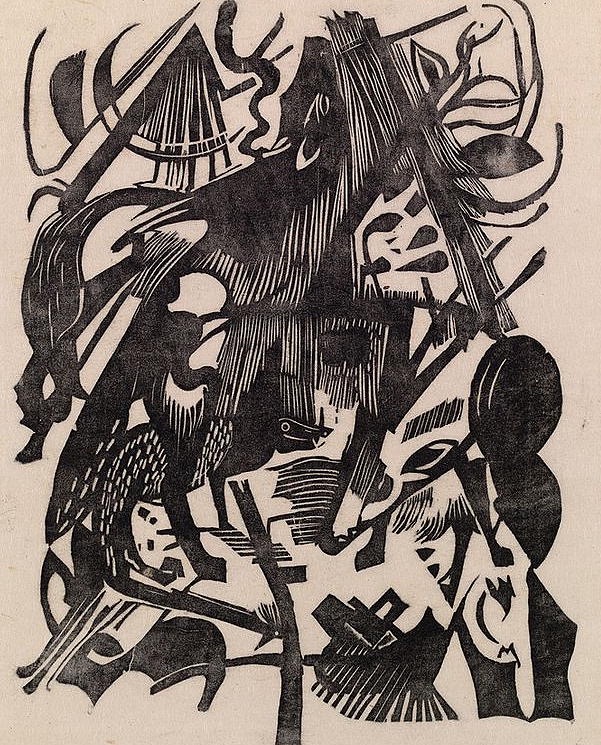WrongQuestion

Franz Marc: Birth of the Wolves [Geburt der Wölf]) (1913)
" … this tactic sometimes even works … "
They always ask the WrongQuestion, probably because there are no completely right and proper ones. The purpose of asking WrongQuestions might vary a bit from what we might innocently consider the purpose of asking a proper question, presuming, of course, that such questions exist. The purpose of asking WrongQuestions might extend no further than a desire to start a conversation, like when someone asks Fundamentally Undecidable Questions, though those might prove both right and proper. The difficulty, or at least a chief difficulty, arises when one presumes that a WrongQuestion is, in fact, a right and proper one, and being right and proper, that it deserves a right and proper answer. Therein begins the trip down into a rabbit hole and into an often inescapable labyrinth. ©2022 by David A. Schmaltz - all rights reserved
There are tells, clues that the question offered might prove problematic. Topping the list of clues stands the ignoble Why? question, the very mother of imprecation. Why questions might most productively be responded to with a heartfelt if slightly ironic "because," because, what are you, a practicing Etymologist? Why questions presume so much prior knowledge that they almost aways encourage an over-extending response, one which forces out bare presumption. Why questions seek not facts but resolution. They attempt a shortcut to understanding, as if there ever could be one. A decent why, a right and proper one, should encourage speculation, not for the purpose of definitively deciding, but to forward, practice, or further refine reasoning such that the conclusion might almost always be that we still don't know but that we hold a better understanding, perhaps only of what the proper answer couldn't be. Why questions might be best considered fundamentally unresolvable.
One might more usefully wonder why the asker posed the why question, anyway. What were they after? Were they playing the sleuth, trying to determine whether the damned butler did something or otherwise find cause so as to affix responsibility or blame? The whole line of questioning presumes facts which could never have been introduced via prior questioning and so amounts to badgering of the witness. One might reasonably conclude in rather short order that the Why? question would inevitably resolve into whys? all the way down, unresolvable. Still, one might usefully engage with a Why? as provocateur, as the starter course of a satisfying ramble, just as long as one manages to reach an understanding that the Why?, however desperately asked, very likely amounted to a WrongQuestion from the outset.
It might prove hopeless to expect anyone to ask a right and proper question. It might, then, prove useful to develop some resistance, immune responses, to encountering another in a seemingly endless series of WrongQuestions. These responses might insist that one tug upon one's own bootstraps a bit and outgrow the naive and often overly-responsible intention of politely answering a query as if to resolve the inquiry without investing in any relationship, as if 'the' answer might somehow prove contextless and all purpose, like my long-ago neighbor in Portland who suffered a stroke and thereafter answered every question by proudly proclaiming, "Eggs." The first response to any question might be some form of asking after the question itself. What's that question about? What's behind it? If, by some terribly unlikely accident, I was able to decisively resolve your question, what would that gain you? What might that gain me? (Just wondering.)
The next thing you know, you're engaging in a conversation, very likely a deeply nested speculation which might well have split that originating question wide open to leave both parties delighted that they'd engaged under the helpful auspices of asking another WrongQuestion, and even grateful that they'd somehow managed not to pose only a rare right or proper one. We're all wrong-headed, it seems, wrong-headed but usually well-intended. Given that right and proper questions seem rarer than hen's teeth, we're sort of forced to rely upon posing instead the WrongQuestion and exposing ourselves to the possibly poisonous reaction of someone mistaking it as a right and proper one. What a blessing when we happen upon a more experienced interlocutor, one courageous or foolhardy enough to question the WrongQuestion rather than just provide an inevitably wrong response.
Why is this book needed now, the publisher asked the Author? The only right and proper answer to such a deeply WrongQuestion simply must be, "It isn't." You see, no manuscript was ever necessary, all were optional, merely choices. No book yet has managed to resolve the human condition, which prominently features the innate ability to usually ask the WrongQuestion in the hope of ultimately resolving something. Curiously, this tactic sometimes even works, like when a budding author notices a glaringly WrongQuestion when proposing the publication of one of his Authoring works. Now, to be courageous or foolhardy enough to choose to not simply answer that WrongQuestion with an overly reactive wrong-headed answer, that's Authoring in practice!


